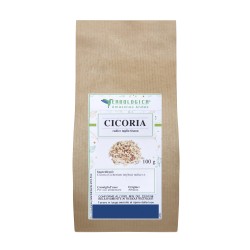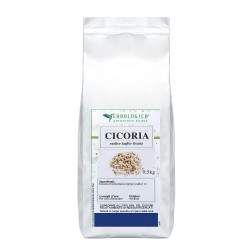
La cicoria è una pianta che appartiene alla famiglia delle Asteraceae, originaria dell'Europa e del Mediterraneo.
Essa è stata utilizzata per molti secoli per le sue proprietà medicinali, ma anche come ingrediente in cucina e come sostituto del caffè.
In questo articolo, scopriremo la storia della cicoria, i suoi benefici nutrizionali, i suoi diversi tipi, le sue molteplici applicazioni in cucina e in medicina,
la sua funzione come sostituto del caffè e come ingrediente per le bevande, e infine anche come colorante naturale.
La storia della cicoria
La cicoria è stata coltivata per la prima volta nell'antica Grecia e nell'Impero Romano, dove veniva utilizzata per le sue proprietà medicinali.
Nel Medioevo, la cicoria era ampiamente utilizzata come sostituto del caffè, in quanto il caffè era ancora sconosciuto in Europa.
La cicoria era anche utilizzata in cucina come ingrediente per insalate e piatti di verdure.
Nel corso del tempo, la cicoria è diventata sempre più popolare in Europa e nel resto del mondo, grazie ai suoi molteplici usi.
I benefici nutrizionali della cicoria
La cicoria è ricca di sostanze nutritive, tra cui vitamine e minerali come vitamina C, calcio, ferro, magnesio e potassio. Inoltre, essa contiene anche un alto contenuto di fibra alimentare,
che può aiutare a migliorare la digestione e a ridurre il rischio di malattie cardiovascolari e diabete di tipo 2.
Alcune ricerche hanno anche suggerito che la cicoria può avere proprietà antinfiammatorie e antiossidanti, che possono aiutare a prevenire il cancro e altre malattie croniche.
I diversi tipi di cicoria
Ci sono diversi tipi di cicoria, tra cui la cicoria belga, la cicoria scarola e la cicoria radicchio.
La cicoria belga ha foglie lunghe e strette, ed è spesso utilizzata in insalate e piatti di verdure.
La cicoria scarola ha foglie più larghe e morbide, ed è spesso utilizzata in zuppe e stufati.
La cicoria radicchio ha una forma a testa rotonda e foglie rosse e bianche, ed è spesso utilizzata in insalate e come decorazione.
Le applicazioni culinarie della cicoria
La cicoria è un ingrediente versatile in cucina, che può essere utilizzato in molte ricette diverse.
Essa può essere utilizzata in insalate, stufati, zuppe, frittate e molto altro ancora.
La cicoria può anche essere cotta al forno o grigliata, per creare piatti gustosi e salutari.
Ha un sapore leggermente amaro, che la rende perfetta per essere utilizzata in ricette di sapore forte.
Le proprietà medicinali della cicoria
La cicoria è stata utilizzata per molti secoli per le sue proprietà medicinali.
Essa è stata utilizzata per trattare problemi digestivi, come la diarrea e la costipazione, ma anche per alleviare il dolore e l'infiammazione.
E' stata utilizzata per aiutare a ridurre il rischio di malattie cardiovascolari e diabete di tipo 2.
Alcune ricerche hanno anche suggerito che la cicoria può avere proprietà antinfiammatorie e antiossidanti.
La cicoria come sostituto del caffè
La cicoria è stata utilizzata per molti secoli come sostituto del caffè, in quanto ha un sapore simile ma non contiene caffeina.
Essa può essere utilizzata per preparare una bevanda simile al caffè, che può essere consumata al mattino o durante la giornata.
Ha proprietà digestive, che possono aiutare a migliorare la salute dell'intestino e a ridurre il rischio di malattie gastrointestinali.
La cicoria nelle bevande
La cicoria può essere utilizzata anche per preparare bevande diverse dal caffè.
Essa può essere utilizzata per preparare tisane e infusi, che possono avere proprietà calmanti e rilassanti.
Può essere utilizzata come ingrediente per bevande analcoliche, come smoothie e frullati, per creare bevande gustose e salutari.
La cicoria come colorante naturale
La cicoria può essere utilizzata anche come colorante naturale in cucina.
Essa può essere utilizzata per colorare dolci e dessert, come torte e biscotti, ma anche per colorare bevande e alimenti salati.
Ha un colore rosso intenso, che può creare effetti visivi interessanti in molte ricette.
Conclusioni: La versatilità della cicoria
In conclusione, la cicoria è una pianta versatile che può essere utilizzata in molte ricette diverse, sia in cucina che in medicina.
Essa può essere utilizzata come sostituto del caffè, come ingrediente per tisane e infusi, come colorante naturale e molto altro ancora.
Ha anche molteplici benefici per la salute, tra cui proprietà digestive, antinfiammatorie e antiossidanti.
Quindi, se stai cercando un ingrediente salutare e gustoso per le tue ricette, la cicoria potrebbe essere la scelta giusta per te.



